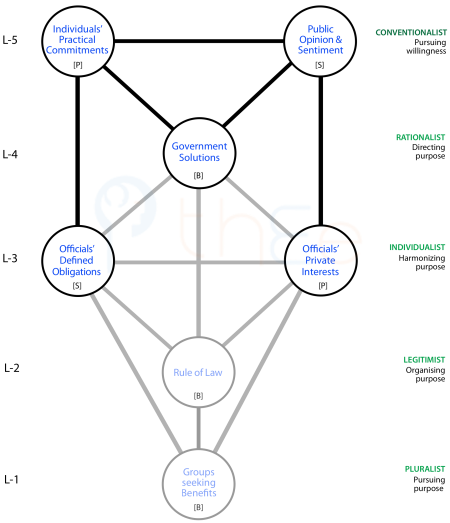«The People» in Politics (CL5)
The people i.e. the people = everybody en masse = the general public is the immediate context within which political choices are made authoritatively by government. The notion of the people en masse playing a major part in is intrinsic to the .
Public Opinion, Social Mood, Sentiment, Herding
The general public has a role in the political process by virtue of the fact that government is supposed to be working for the public benefit. However, the only way that most people can express their views in society is to let their views blend and merge with others to form a general . This is based on widely held —often fostered by the media. These have variable validity, and often reflect the prevailing rather than any deep understanding.
do not function in a rational fashion.
The general public is always subject to flows of feeling or sentiment associated with pervasive moods. Social moods may be positive (e.g. confidence, enthusiasm, openness, inclusionist) or negative (e.g. fear, anger, disappointment, exclusionist).
Moods can generate contagious atmospheres and herd-like behaviour that shows up in such things as joyous celebrations, raptures over film stars, weeping hysteria over the death of a leader, runs on banks and speculative orgies.
Emotions in individuals have a physiological basis and social mood swings are probably of biological origin. Public opinion and sentiment are affected by both major historical events and the most recent experiences.
Social Context: «Social» or «Private» or Both?

A purely social aspect of the can be easily seen in . Pollsters can identify this social phenomenon by questioning a tiny sample.
However, when individuals act decisively and commit themselves (even if as part of a herd), it is a private matter with each person needing to take their own circumstances into account and feeling compelled to accept responsibility for their own actions. The result is a range of adaptations to society in regard to practical matters (e.g. where to live, what business to pursue, how to look after children or aged parents). Multiple similar, even near-identical, practical adaptations cannot be unified but, taken together with firms that emerge to serve the herd, they generate a status quo and a major sunk cost that cannot be easily ignored by governments.
So there are two political Centres:
- —private pole ()
- —social pole ()
- Now examine influences of social context in more detail,
- and then consider the place of morality in politics.
Originally posted: July 2009; Last updated: 12 June 2014.